Reg No. - CHHBIL/2010/41479ISSN - 2582-919X
Political Year Ender 2024: From Modi’s hat-trick, Nitish’s U-turn to Kejriwal-Soren being sent to jail, this is how politics played out in 2024

mportant political events of 2024 – Photo-channel24india.com
Political Year Ender 2024: The year 2024 was very important in the world of politics. This year, apart from the Lok Sabha, assembly elections were held in eight states in India, which changed many equations. Chief Minister Arvind Kejriwal in Delhi and Hemant Soren in Jharkhand were jailed. Let us know about some of the major political events of 2024
The year 2024 is also about to pass. This year the people of India witnessed many important political events. This was the year when the Lok Sabha elections were held and after 62 years a party formed the government for the third consecutive time in the country. Apart from the Lok Sabha, assembly elections of eight states were also held this year. This year a political crisis arose in the country’s capital when Chief Minister Arvind Kejriwal went to jail. A similar incident happened in Jharkhand as well. The government also faced a crisis in Himachal. Let us know some of the major political events that happened in 2024.
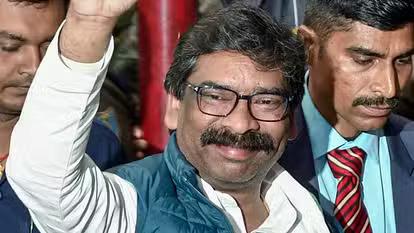
Arrest of Hemant Soren – Photo: ANI
January:
The Lok Sabha election activities intensified from the beginning of the year. Prime Minister Modi reached the southern states as soon as the year began. He visited many temples before the consecration of Ram temple in Ayodhya on January 22. Along with this, he also did road shows in southern states. Many political analysts called it BJP’s Mission South.
In mid-January, a major development took place affecting Maharashtra politics. The decision on the disqualification of MLAs of both the rival factions of Shiv Sena was taken. The disqualification decision was pronounced by Maharashtra Assembly Speaker Rahul Narvekar, which was ordered by the Supreme Court. The speaker rejected the arguments of the Uddhav faction and considered the Shinde faction as the real Shiv Sena.
At the end of the month, Bihar once again saw Nitish Kumar changing alliances. Nitish Kumar resigned from the post of Bihar CM and formed a new government with the BJP. This was not the first time Nitish Kumar left the Mahagathbandhan and joined the BJP-led NDA alliance. Earlier, JDU had changed partners thrice but interestingly, Nitish Kumar remained the Chief Minister every time. Although the number of MLAs of his party was less than that of his ally.
In the end of January itself, there was a big upheaval in Jharkhand. Hemant Soren, who was embroiled in the illegal land scam, resigned from the post of Chief Minister of Jharkhand. After resigning, he was arrested. After this, the Jharkhand Mukti Morcha (JMM) and Congress alliance elected Champai Soren, the Transport Minister in the Soren government, as the leader of the legislative party.
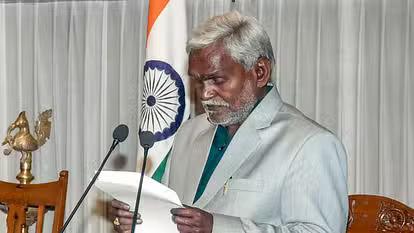
Champai Soren became Chief Minister – Photo: ANI
February:
Earlier this month, Jharkhand politics was in the news the most. After the resignation of Hemant Soren, Champai Soren became the Chief Minister of the state. Two more ministers also took oath with him. Predicting his third term at the beginning of the month, the Prime Minister gave the slogan ‘Abki Baar 400 Paar’. Prime Minister Narendra Modi gave this slogan while replying to the motion of thanks on the President’s address in the Lok Sabha.
The Election Commission declared the Nationalist Congress Party of Ajit Pawar as the real NCP. After more than 10 hearings lasting more than six months, the Commission settled the dispute in the NCP.
Sonia Gandhi became the third member of the Nehru-Gandhi family to be elected to the Rajya Sabha in February. Earlier, Uma Nehru and Indira Gandhi from the family were elected unopposed to the Rajya Sabha.
In mid-February, the country’s Supreme Court gave a big decision on electoral bonds. The Supreme Court termed the electoral bond scheme unconstitutional and banned it. The court criticized the electoral bond scheme and said that it is very important to get information about the funding of political parties.
At the end of the month, there was political upheaval in Himachal Pradesh. It started with the Rajya Sabha elections in which six MLAs cross-voted. Due to this, without the required numbers, BJP got its candidate Harsh Mahajan elected against Abhishek Manu Singhvi of Congress. Sukhu government also came under crisis due to cross voting, although this crisis was later averted.
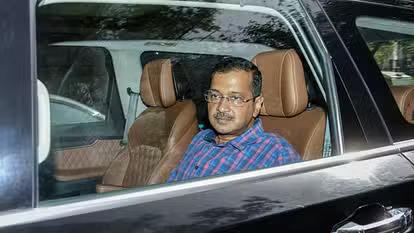
Arrest of Arvind Kejriwal – Photo: ANI
March:
Before the Lok Sabha elections, political activities in the country intensified in March. In this episode, a big political development took place when Chandrababu Naidu’s TDP returned to NDA. Both the parties had fought the 2014 elections together but by 2018, their paths had separated.
On the other hand, two big political events took place in Haryana. The four year four month old alliance of Bharatiya Janata Party and Jannayak Janata Party broke. With the breaking of the alliance, there was a change in leadership in the state. Chief Minister Manohar Lal Khattar resigned from his post and Nayab Saini became the Chief Minister in his place.
On March 16, the Election Commission announced the dates for the Lok Sabha and assembly elections of four states. With the announcement of the dates, the political bugle for the general elections was blown and political parties entered the election fray.
The end of March brought trouble for the ruling Aam Aadmi Party of Delhi. The Enforcement Directorate (ED) arrested Chief Minister Arvind Kejriwal in the Delhi liquor policy scam case. This was the first time a

April:
At the beginning of this month, there was a lot of excitement about the Lok Sabha elections. For the Lok Sabha elections, Congress released its manifesto in the name of ‘Nyaya Patra’ and BJP released its manifesto in the name of Sankalp Patra. The first two phases of Lok Sabha elections were also held in April. Along with this, the political fate of many bigwigs including Nitin Gadkari, Nakul Nath, Rahul Gandhi, Shashi Tharoor, Hema Malini got captured in the EVM. In this month, voting was held for the Arunachal Pradesh and Sikkim assembly elections.
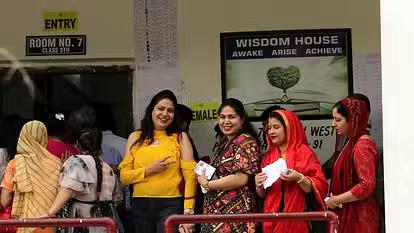
Lok Sabha Elections 2024 – Photo : Samvad
May:
The first big political news of this month was the announcement of Rahul Gandhi’s candidature from Rae Bareli seat. On the last day of nomination, Congress declared Rahul Gandhi as its candidate from Rae Bareli seat. The month of May also brought relief for Aam Aadmi Party when Arvind Kejriwal got interim bail in the Delhi liquor policy case. Delhi CM got this relief from the Supreme Court.
The third, fourth, fifth and sixth phase of Lok Sabha elections were also held in May. In this, voting was also held on the seats of big faces like Amit Shah, Rajnath Singh, Jyotiraditya Scindia, Rahul Gandhi, Smriti Irani, Omar Abdullah, Maneka Gandhi, Dharmendra Yadav, Manohar Lal, Chirag Paswan, Dimple Yadav,
Asaduddin Owaisi, Supriya Sule and Sunetra Pawar.
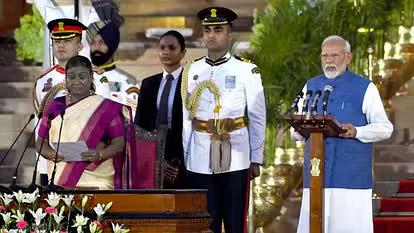
Narendra Modi became Prime Minister for the third time – Photo: ANI
June:
This month started with the seventh phase of Lok Sabha elections. In this phase, voting took place on the seats of PM Modi, Kangana Ranaut, Anurag Thakur, Charanjit Singh Channi. With the seventh phase of voting, exit polls were released by different media channels and survey agencies on June 1. All the surveys projected a landslide majority for the Bharatiya Janata Party-led National Democratic Alliance (NDA).
The results of the Lok Sabha elections came on June 4, which surprised everyone by defying the exit poll estimates. The BJP was able to reach only 240 seats, far from the majority. It reached 293 with the help of NDA allies. At the same time, the opposition alliance India gave a tough fight with 240 seats. After the results, Narendra Modi took oath as the Prime Minister for the third time on June 9. Along with the Lok Sabha elections 2024, the results of the assembly elections of Arunachal Pradesh, Sikkim, Andhra Pradesh and Odisha came.
In Andhra Pradesh, the TDP-BJP-Jana Sena Party coalition government was formed in place of YSR and Chandrababu Naidu became the CM. In Odisha, the BJP government was formed in place of Biju Janata Dal and Mohan Charan Manjhi was given the command of the state. In Arunachal Pradesh, the BJP retained its power and Pema Khandu again became the Chief Minister. In Sikkim, the Sikkim Krantikari Morcha retained its government and Prem Singh Tamang became the head of the state.
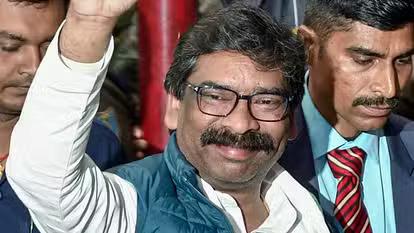
Hemant Soren released from jail – Photo: AN
July:
At the beginning of this month, once again the change of leadership in Jharkhand was a topic of discussion. Hemant Soren, who was released from jail, took oath as the CM of the state for the third time. Earlier, Champai Soren resigned from the post of Chief Minister of Jharkhand.
This month, voting was held for by-elections on 13 assembly seats in seven states. Of these, the maximum four seats were in West Bengal. At the same time, votes were cast on three seats in Himachal Pradesh and two seats in Uttarakhand. Elections were held for the first time after the Lok Sabha election results. The ruling BJP at the Center suffered losses in this election. At the same time, the opposition alliance won 10 out of 13 seats. BJP won one seat each in Himachal and Madhya Pradesh and one in Bihar.
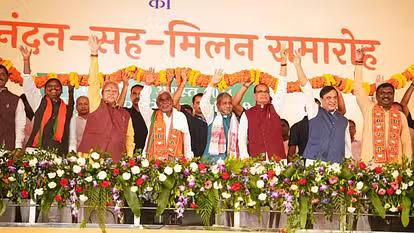
Former Jharkhand Chief Minister Champai Soren joins BJP – Photo: ANI
August:
The Waqf Amendment Bill introduced in Parliament at the beginning of this month was in the news. Many opposition parties including Congress and SP opposed this bill. At the same time, the government says that through this bill, the unlimited powers given to the Waqf Board will be curbed and management will be done in a better and transparent manner. The government later recommended sending it to the Joint Parliamentary Committee (JPC). This month, AAP got a big relief when the Supreme Court granted bail to former Delhi Deputy Chief Minister Manish Sisodia.
In August itself, Karnataka’s Mysore Urban Development Authority (MUDA) land scam was in the news. Chief Minister Siddaramaiah, his wife Parvati BM and others were accused in it.
In the middle of the month, the Election Commission announced the dates for assembly elections in Haryana and Jammu and Kashmir. Jammu and Kashmir was under the administration of the Lieutenant Governor since becoming a Union Territory on 5 August 2019.
There was political upheaval before the elections in Jharkhand. Champai Soren, who was once the Chief Minister of the state from JMM, joined the BJP. He parted ways with the party saying that he was being insulted in JMM.

Arvind Kejriwal gets bail – Photo: ANI
September:
This month again brought a big relief for AAP when Aam Aadmi Party chief and Delhi Chief Minister Arvind Kejriwal got bail. Kejriwal, who was jailed in the Delhi liquor scam case, came out of jail. The Supreme Court gave this relief to the AAP leader. Before Kejriwal, many big leaders of AAP had got bail in the same case, including Manish Sisodia, Sanjay Singh, Vijay Nair.
The report of the Kovind Committee on ‘One Country, One Election’ was also approved by the Union Cabinet in September. The report was presented before the Cabinet as part of the 100-day agenda of the Law Ministry, which was approved by the Cabinet.
Assembly elections were held in the Union Territory of Jammu and Kashmir after 10 years. Voting was held in the state in two phases in September

LG Manoj Sinha and Omar Abdullah – Photo: ANI
October:
Earlier this month, the results of the Haryana and Jammu and Kashmir assembly elections were in the headlines. The ruling BJP in Haryana created history and for the first time since the formation of Haryana, the BJP became the party that formed the government for the third consecutive time. Nayab Singh Saini became the Chief Minister of Haryana for the second time. At the same time, the National Conference returned to power in Jammu and Kashmir after 10 years. Farooq Abdullah’s National Conference secured a majority in alliance with the Congress. Apart from this, some independent and MLAs from other parties also supported the government. Omar Abdullah took charge of the Union Territory.
In mid-October, the Election Commission announced the dates for the assembly elections in Maharashtra and Jharkhand. Along with this, by-elections were also fixed for 48 assembly seats in 14 states and two Lok Sabha seats in two states across the country. This also included the Wayanad Lok Sabha seat vacated by Rahul Gandhi and Akhilesh Yadav’s Karhal seat.
The major political event of this month was also the candidature of Congress General Secretary Priyanka Gandhi for the Lok Sabha by-election. Priyanka filed her nomination for the Wayanad Lok Sabha by-election in the presence of her mother Sonia Gandhi, brother Rahul Gandhi and Congress national president Mallikarjun Kharge.
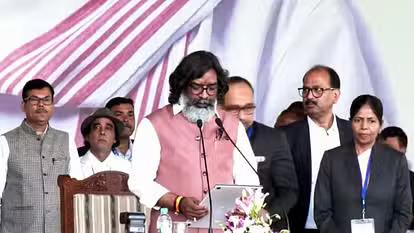
Coronation of Hemant Soren – Photo: ANI
November:
Most of the headlines of this month were about Maharashtra and Jharkhand. Two phases of assembly elections were held in Jharkhand on 13 and 20 November. On the 20th, voting was held for all 288 seats in Maharashtra for the assembly elections.
The results of the assembly elections in Jharkhand and Maharashtra were declared on 23 November. The Jharkhand Mukti Morcha-led Mahagathbandhan defeated the BJP-led NDA and won the majority. At the same time, the Mahayuti government returned to power in Maharashtra with a thumping majority once again.
The results of the by-election held on Kerala’s Wayanad Lok Sabha seat were declared in November itself. Congress candidate Priyanka Gandhi registered a big victory. Priyanka, who claims to have about three and a half decades of political experience, entered electoral politics for the first time and achieved success in the very first election.
The buzz for the upcoming Delhi assembly elections of this month also intensified. The Aam Aadmi Party released the first list of 11 candidates. There are six names in this list who had joined AAP from Congress or BJP within the last 25 days. The party also reposed faith in three candidates who lost in 2020.
At the end of the month, Hemant Soren’s coronation was the center of discussion. He became the Chief Minister of Jharkhand for the fourth time. With this, his fourth innings began. This is the first time in the history of Jharkhand. In the 24-year history of this newly formed state, three faces have been the Chief Minister three times each. These included Hemant Soren’s father Shibu Soren, BJP leader Arjun Munda and Hemant Soren himself. As soon as he took oath for the fourth time, Hemant went ahead of this category.
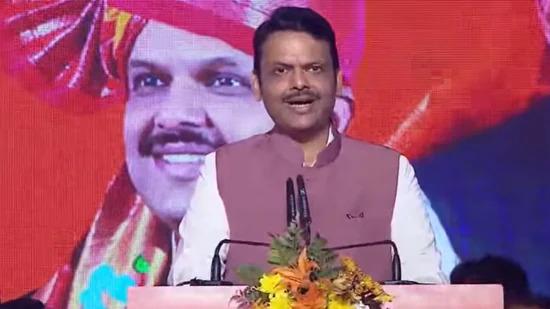
Fadnavis takes oath as Maharashtra CM –photo –channel24india.com
December:
This month’s news was about Maharashtra. After the results were announced on November 23, there was uncertainty about the face of the Chief Minister in Maharashtra for 11 days. On the other hand, there were also reports of outgoing Chief Minister Eknath Shinde being angry. Amidst meetings from Mumbai to Delhi, BJP decided that its leader Devendra Fadnavis would be the next Chief Minister of the state. On December 5, Fadnavis took over the seat of power in Maharashtra for the third time. In his cabinet, Eknath Shinde and Ajit Pawar took oath as Deputy Chief Ministers. NDA’s show of strength was also seen in the swearing-in ceremony held in Mumbai.
This month, the tumultuous winter session of Parliament was also in constant discussion. The incident of finding a bundle of notes in the Rajya Sabha also remained in the headlines.
In December itself, there was discussion about the second, third and fourth list of AAP. The second list of candidates released for the Delhi Assembly elections included names like former Deputy Chief Minister Manish Sisodia, educationist-turned-politician Awadh Ojha and Assembly Deputy Speaker Rakhi Birlan. Patparganj MLA Manish Sosodia was given ticket from Jangpura assembly seat this time. The fourth list included the names of former Chief Minister Arvind Kejriwal and current Chief Minister Atishi. With this, AAP has decided its candidates on all 70 seats.
Apart from this, Congress has also released its first list for Delhi assembly elections. The first list includes big names like Delhi Congress President Devendra Yadav, Anil Chaudhary, Sandeep Dixit and Harun Yusuf. Sandeep Dixit will be the Congress candidate against Aam Aadmi Party’s national convenor Arvind Kejriwal on the New Delhi seat. Sandeep Dixit, son of former Delhi Chief Minister Sheila Dixit, has won the 2004 and 2009 Lok Sabha elections from East Delhi Lok Sabha seat.
YOU MAY LIKE THIS










